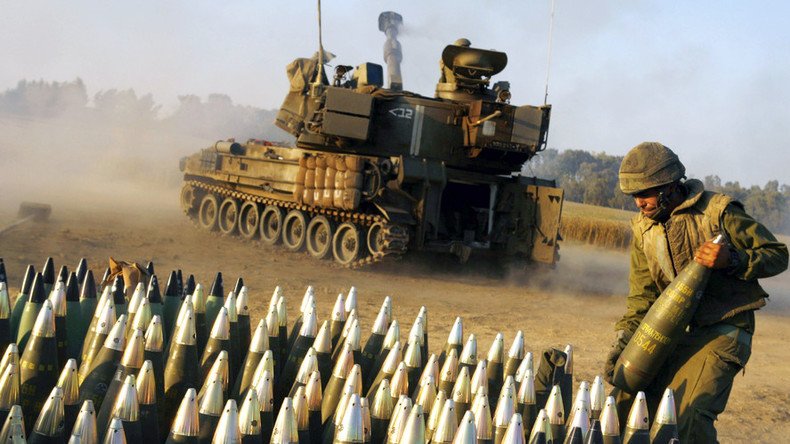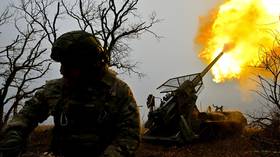‘Knock-on-the-roof’: US military adopts Israeli battlefield tactic for ISIS

The Pentagon has adopted an Israel Defense Forces tactic for bombing the Islamic State. “Knock on the roof,” the IDF method of firing a missile at a civilian home to alert occupants that a larger attack is pending, is often used in Palestinian territories.
During a Pentagon briefing on Tuesday, Air Force Major General Peter Gersten, who is responsible for all combat operations across Iraq and Syria, publicly described its “knock operation” as having been influenced by the Israelis.
"We've certainly watched and observed their procedure. As we formulated the way to get the civilians out of the house, this was brought forward from one of our experts," Gersten told reporters.
Pentagon adopts Israeli "knock-on-the-roof" tactic in bombing ISIShttps://t.co/CiNchBDUf2
— Ram Ramgopal (@RamCNN) April 26, 2016
The example given was an operation against an Islamic State (IS, formerly ISIS/ISIL) financial storage center in southern Mosul, Iraq. Gersten said the US had been watching the house of an IS finance operative for some time before the bombing on April 5.
"He was the major distributor of funds to Daesh [ISIS] fighters," said Gersten, who is deputy commander for operations and intelligence for the anti-IS Operation Inherent Resolve, in a news transcript. "We watched him come and go from his house, we watched his supplies, we watched the security that was involved in it. And we also watched occasionally a female and her children in and out of the quarters."
STRIKE VIDEO: #Coalition strike denies safe haven for #ISIS ops #Syria#news#ISIL#militaryhttps://t.co/Mg40tX5fkQpic.twitter.com/OyQEa2WJvv
— Inherent Resolve (@CJTFOIR) April 24, 2016
Gersten said they formulated a plan to ensure that women, children and non-combatants were clear of the bombing site. He said that IS operates in highly congested urban areas, which is of great concern to the military who are keen to minimize civilian casualties.
“We went as far as actually to put a Hellfire on top of the building and air-burst it so it wouldn’t destroy the building, simply knock on the roof to ensure that she and the children were out of the building,” he recounted to reporters. “And then we proceeded with our operations.”
Coalition air strikes annihilates ISIS weapon storage [VIDEO] https://t.co/QUCGWh2EFgpic.twitter.com/Q5xWU8bqVj
— RT America (@RT_America) February 22, 2016
Initially the US thought the operation had spared the women inside, but it had not.
“[We] absolutely did see the women and child leave…the men that were in that building, multiple men, literally trampled over her to get out of the building,” Gersten recounted. “And we watched her and observed her leaving the building. And she cleared the building, and we began to process the strike…it ended up in a civilian casualty…she ran back into the building.”
It was "very difficult for us to watch, and it was within the final seconds of the actual impact," Gersten recalled.
Gersten said that some IS fighters had worked themselves “into the fabric of the people.”
“They are using the civilian force as human shields, and we will fight and do everything possible we can to keep those civilians casualties to an absolute, absolute minimum,” he added.
URGENT: 20 civilians killed in anti-ISIS in airstrikes between September, February – CENTCOM https://t.co/clRsiSz7dwpic.twitter.com/WIkEU4B2E2
— RT America (@RT_America) April 22, 2016
The video of the entire bombing on April 5 is unlikely to be released by the Pentagon, because it shows a civilian being killed, a defense official told CNN. Major General Gersten said the value of cash facility was somewhere between $150 million dollars. He also said the US has no evidence the financial official escaped the attack, and believe he is likely dead.
Gersten said the knock operation had only be used once, but that it will be employed again “when a situation presents itself.”
‘A good strike’: Pentagon video shows US bombing ISIS cash depot https://t.co/60lMDfQkI8pic.twitter.com/gfYI4sPLV5
— RT America (@RT_America) January 18, 2016
The Israeli tactic has received criticism from human rights groups as the “roof knocks” have been shown to strike and kill inhabitants. In 2014, Amnesty International called for a United Nations investigation into what it alleged were war crimes committed by Israeli and Hamas fighters during Operation Protective Edge in July 2014 where thousands of Palestinians were killed and wounded.
Major General Gersten said during the briefing that IS is suffering from morale problems among its fighters, with a shortage of cash resulting after more than a dozen airstrikes against money centers as well as their ability to finance the war through oil refineries being destroyed.
There has also been a drop off of foreign fighters coming into Syria and Iraq, down to about 200 a month, compared to a year ago when 1,500 people were entering each month, Gersten relayed, speculating that the drop might be due to stronger border controls.
He also said that the US is also putting a long-range artillery system in southern Turkey to conduct more strikes against IS targets in Syria.












